Montreal Mafia vs. Street Gangs-- A Conflict
Montreal has always been the central point and most important Canadian city of Italian organized crime. This is due to its proximity to water and New York City. Montreal's crime scene has been divided amongst the Dubois brothers, the West End gang, Irish-made organization (who controls the seaport), Asian and Colombian groups and the Italians.
Canada is called "the laboratory of organized crime" (Grind 365). It is the first place to see partnerships between the "traditional" mafia and biker gangs, street gangs and other crime clans. The last few years were rough for the Montreal organized crime. Assassinations and arrests of important mafia figures result in the downfall of the Mafia. Some experts believe the changes and turmoil happening in the Montreal faction will affect the North American organization. But who is responsible for this shift? Many blame the fragile state of the mafia on the street gangs who are trying to take over the Montreal crime scene. If this is true; who would be the most suited to rule the Montreal crime scene?
Italian organized crime has been operating in Canada for almost a century. It became more imminent in the 40s when important members came to Montreal and to other important Canadian cities after the Second World War. The two main groups are the Sicilians and the Calabrians (known as 'Ndrangheta). These two clans have been fighting against each other since the arrival of the Sicilians, but the latter clan is now considered the most important and dangerous.
Sicilians vs. Calabrians--A conflict
The Calabrian clan was constituted of the Vincenzo and Cotroni brothers operating in Montreal since the late 40s. They shipped an important amount of heroin to the "world's most important market: New York City" (De Champlain). Cotroni brothers were allied with Corsicans and French clandestine laboratories that created the heroin. By the 50s, Montreal was the most important point of entry for heroin in North America. The caporegime at that time was Carmine Galante. He oversaw the crime activities such as heroin smuggling and the rackets--the latter being taken care of by the Cotroni brothers.
The New Comers
Sicilians arrived to Montreal in the 50s. The first family was the Cuntreras, who later (late 60s) moved to Caracas, Venezuela. Then, the Mannos, Rendas, Cammalleris, Cuaranas, Gerlandos, and the Rizzutos immigrated to Montreal. These families all came from the same Sicilian regions, which was known to be a center for Mafia activities. The "cosa nostra" ran through their blood from generation to generation.
The Cold Welcome
The Calabrians did not offer a warm welcome to Sicilians upon their arrival. The rules of the American mafia didn't allow the new comers to operate automatically. This rule didn't please Nicolo Rizzuto, who ignored the warnings and got involved in the drug business.
During the late 60s, Paolo Violi (Cotroni family) was in his glory. He was the one who warned the Sicilian clan not to get involved right away. Violi was married to the daughter of an important mafia boss in Ontario, who was linked to the powerful Buffalo boss of the time--Magaddino.
Rizzuto's rebelious behavior led to a major conflict between him and Paolo Violi. Rizzuto had already made himself comfortable in the Cotroni family and Violi was not happy with the new comer's attitude toward the Cotroni's boss. Nicolo Rizzuto often traveled to Caracas and Sicily without informing the Cotronis. Ambitious Rizzuto qualified the Montreal Mafia of "unstructured". Cotroni tried to mediate the conflict between Violi and Rizzuto instead of listening to Violi's suggestion to expel the Sicilian. In the summer of 1972, many meetings happened in Montreal involving bosses from Italy, United states and Canada to debate what should happen to Rizzuto. The conclusion: Nicolo Rizzuto should stay a part of the Cotroni family. The decision didn't please Violi, who "put a contract" on Rizzuto's head (De Champlain). Rizzuto aware that his life was highly threatened left for Caracas where he joined Cuntrera. Together they organized an international heroin pipeline.
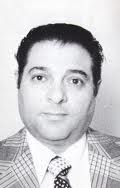 Paolo Violi
Paolo Violi
The Calabrian clan was constituted of the Vincenzo and Cotroni brothers operating in Montreal since the late 40s. They shipped an important amount of heroin to the "world's most important market: New York City" (De Champlain). Cotroni brothers were allied with Corsicans and French clandestine laboratories that created the heroin. By the 50s, Montreal was the most important point of entry for heroin in North America. The caporegime at that time was Carmine Galante. He oversaw the crime activities such as heroin smuggling and the rackets--the latter being taken care of by the Cotroni brothers.
The New Comers
Sicilians arrived to Montreal in the 50s. The first family was the Cuntreras, who later (late 60s) moved to Caracas, Venezuela. Then, the Mannos, Rendas, Cammalleris, Cuaranas, Gerlandos, and the Rizzutos immigrated to Montreal. These families all came from the same Sicilian regions, which was known to be a center for Mafia activities. The "cosa nostra" ran through their blood from generation to generation.
The Cold Welcome
The Calabrians did not offer a warm welcome to Sicilians upon their arrival. The rules of the American mafia didn't allow the new comers to operate automatically. This rule didn't please Nicolo Rizzuto, who ignored the warnings and got involved in the drug business.
During the late 60s, Paolo Violi (Cotroni family) was in his glory. He was the one who warned the Sicilian clan not to get involved right away. Violi was married to the daughter of an important mafia boss in Ontario, who was linked to the powerful Buffalo boss of the time--Magaddino.
Rizzuto's rebelious behavior led to a major conflict between him and Paolo Violi. Rizzuto had already made himself comfortable in the Cotroni family and Violi was not happy with the new comer's attitude toward the Cotroni's boss. Nicolo Rizzuto often traveled to Caracas and Sicily without informing the Cotronis. Ambitious Rizzuto qualified the Montreal Mafia of "unstructured". Cotroni tried to mediate the conflict between Violi and Rizzuto instead of listening to Violi's suggestion to expel the Sicilian. In the summer of 1972, many meetings happened in Montreal involving bosses from Italy, United states and Canada to debate what should happen to Rizzuto. The conclusion: Nicolo Rizzuto should stay a part of the Cotroni family. The decision didn't please Violi, who "put a contract" on Rizzuto's head (De Champlain). Rizzuto aware that his life was highly threatened left for Caracas where he joined Cuntrera. Together they organized an international heroin pipeline.
 Paolo Violi
Paolo Violi
Quebec Government Gets Involved
In the mid 70s, the Quebec government formed the Commission of Inquiry on Organized Crime to investigate on the criminal activities happening in the metropolis. The results: Cotroni was sentenced to one year of incarceration for evasive answers and Violi became the new caporegime. But in 1975, he was sentenced to one year for contempt. The Calabrians were scrutinized, while the Sicilians managed to escape it. It was a good opportunity for them to take over the crime activities.
The commission had been monitoring conversations for years, which didn't help Violi's case. Some of the witnesses called before the commission, who were active members, were killed. One of those witnesses, Pietro Sciarra, was gunned down three months after his testimony, in 76, outside a movie theater, where he had watched the movie "The Godfather."
This was a sign that Violi's position was no longer secured. He was not in good terms with many North American families, especially in New York. He was shot in 78, after being released of prison. The reign of the Violis was officially over when Paolo's brother was shot in 1980. Cotroni was never assassinated because of the respect other families had for him. He died of natural causes in 1984.
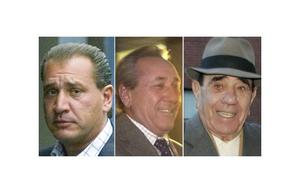 Rizzuto dynasty
Rizzuto dynastyThe Reign of The Sicilians
The way was cleared for the Sicilians. Vito Rizzuto, Nicolo's son, came back to Montreal after having fled to Caracas. Vito spent the following years restructuring Montreal's crime operations. "He established peace and order among the other mafia groups in Canada, and with other non-mafia related crime groups, such as the Hells angels" (Grind 365).
Nicolo resided permanently in Caracas, but visited Montreal frequently to make sure everything was working properly. In 1988, he was arrested for cocaine possession. The Rizzutos made their fortune in the 80s through their massive shipments of cocaine and hashish. Also, they managed to invest money in legal businesses such as hotels, restaurants, and real estates.
How Things Got Complicated
Vito Rizzuto was at the top of his game when Anti-gang squad of the Montreal police knocked on his door on January 20th, 2004 at 6 AM. He was under arrest as the "U.S. authorities had issued an extradition in relation to his alleged participation into the murder of three Bonanno captains on May 5th, 1981"(De Champlain). They already had pictures of the Montreal boss coming out of a Bronx motel, but it wasn't sufficient. The last proof was provided by members of the Bonnano Family, Salvatore Vitale and Frank Lino who decided to help the police to lighten their sentence. Vito Rizzuto is now serving a 10-year sentence in the United-States. Even if he was in prison, he has been charged for other crimes, including one in Italy.
The Rough Times
In December 2009, Vito Rizzuto's son was murdered in NDG. Nick Jr. was not known as an active member in his father's businesses. Many Mafia experts are confident that it is the doing of street gangs. " 'What I can see is that the street gangs, who used to do the dirty work for the Mafia, now are not satisfied with the role anymore.', said Antonio Nicaso, author of several studies on Canada's Mafia, 'First of all because what remained of the Mafia decided not to use them the way they used to do when Vito Rizzuto was in power' "(Grind 365). The main fear is that if the street gangs achieve here, it might inspire other gangs to do so in other cities. North American mafia is losing power, as fewer members are joining the organization. Furthermore, 2010 saw even more tragedies and uncertainty for the Rizzuto clan. Paolo Renda, the presumed consigliere was kidnapped in May and many cafes and alleged mafia-related businesses were bombed. But the main event was the assassination of the patriarch of the family, Nicolo Rizzuto on November 10th at his domicile. Although many blamed the street gangs for the murder of Nick Jr., the kidnapping, and the bombings; the murder of Nicolo is believed to be from an internal source.
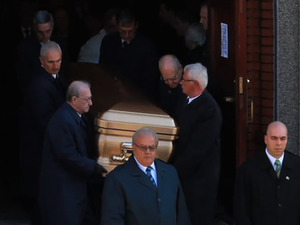 Nicolo Rizzuto's Casket
Nicolo Rizzuto's Casket Bibliography
Contenta, Sandro. "The daylight a Montreal mafia figure has worsened fears of an organized gang war."
globalpost.com. The Global Post. Web. 25 Oct. 2010
De Champlain, Pierre. "The Mafia of Montreal: A short History." gangstersinc.tripod.com. n.d. Web. 25
Oct. 2010
Harrold, Max. and Mennie, James. "Nick Rizzuto Jr. gunned down in N.D.G." canada.com/news. The
Gazette. Web. 26 Oct. 2010
Lemieszewski, Stefan. "Mafia similarities and links between the east and the west." telusplanet.net. n.d.
Web 26 Oct. 2010
Little Joe Shots. "Montreal Crime Family: part 1 to 10." mafia-international.com, n.d. Web. 25 Oct.
2010
Terry, Ashley. "The Rizzuto Family." globalnews.ca. Global News. 26 Oct. 2010
"Mtl Street Gangs vs. The Mafia." grind365.com. n.d. 27 Oct. 2010
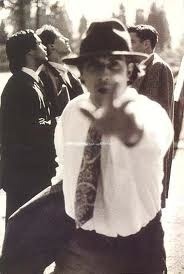
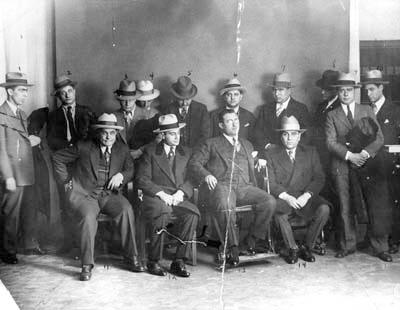
Leave a comment